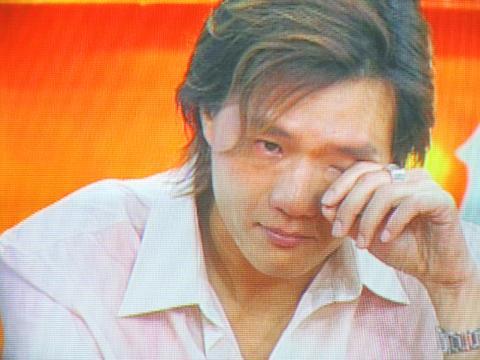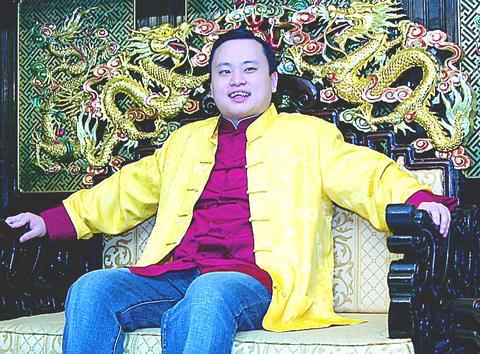Taiwan's veteran Mando-pop diva Chang Hui-mei (
"I was performing a concert in Chongqing at the time of the announcement and everyone, whether they knew each other or not, was hugging each other. I was truly honored to be there on stage with everyone shouting, `We got the Olympics!'"

PHOTO: TAIPEI TIMES
When the topic of her latest encounter with Chinese nationalist protesters in Hangzhou was raised, the interviewer asked whether the event had left her with any lasting impressions and whether she had learned that "there are things you can do and things you can't do?"

PHOTO: TAIPEI TIMES
She replied: "Of course. ? I know that my influence goes beyond those around me to many more people, so I need to be more cautious. I know what I should do." Indeed, if her albums don't sell any more in Taiwan, better to pave the way for a smooth future in China.
Back in Taiwan, last weekend at the Formoz Festival it wasn't performers facing the heat from the powers that be, but rather the other way round. In a manifestation of the punk spirit in Taiwan, the nation's President Chen Shui-bian (
Meanwhile in Hong Kong over the weekend, Jay Chou (
Last week Pop Stop also had a random encounter deep in the mountains of Hsinchu County with Chiang Wei-wen (
Last week Pop Stop reported on Alex To's (
And in China, authorities have nixed one of the songs on the album for lyrics that translate like this: "Where'd you learn that? Touching me so I get so swollen ? I just want it all, and if you can't do it for me, I won't love you anymore."

Towering high above Taiwan’s capital city at 508 meters, Taipei 101 dominates the skyline. The earthquake-proof skyscraper of steel and glass has captured the imagination of professional rock climber Alex Honnold for more than a decade. Tomorrow morning, he will climb it in his signature free solo style — without ropes or protective equipment. And Netflix will broadcast it — live. The event’s announcement has drawn both excitement and trepidation, as well as some concerns over the ethical implications of attempting such a high-risk endeavor on live broadcast. Many have questioned Honnold’s desire to continues his free-solo climbs now that he’s a

As Taiwan’s second most populous city, Taichung looms large in the electoral map. Taiwanese political commentators describe it — along with neighboring Changhua County — as Taiwan’s “swing states” (搖擺州), which is a curious direct borrowing from American election terminology. In the early post-Martial Law era, Taichung was referred to as a “desert of democracy” because while the Democratic Progressive Party (DPP) was winning elections in the north and south, Taichung remained staunchly loyal to the Chinese Nationalist Party (KMT). That changed over time, but in both Changhua and Taichung, the DPP still suffers from a “one-term curse,” with the

Jan. 26 to Feb. 1 Nearly 90 years after it was last recorded, the Basay language was taught in a classroom for the first time in September last year. Over the following three months, students learned its sounds along with the customs and folktales of the Ketagalan people, who once spoke it across northern Taiwan. Although each Ketagalan settlement had its own language, Basay functioned as a common trade language. By the late 19th century, it had largely fallen out of daily use as speakers shifted to Hoklo (commonly known as Taiwanese), surviving only in fragments remembered by the elderly. In

Lines between cop and criminal get murky in Joe Carnahan’s The Rip, a crime thriller set across one foggy Miami night, starring Matt Damon and Ben Affleck. Damon and Affleck, of course, are so closely associated with Boston — most recently they produced the 2024 heist movie The Instigators there — that a detour to South Florida puts them, a little awkwardly, in an entirely different movie landscape. This is Miami Vice territory or Elmore Leonard Land, not Southie or The Town. In The Rip, they play Miami narcotics officers who come upon a cartel stash house that Lt. Dane Dumars (Damon)